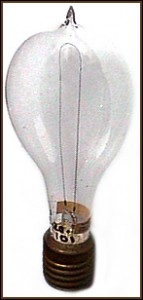Without Failure, there is no Learning
Thomas Edison was relentless in his quest to find a way to produce a good light bulb or rather a reliable filament. Light bulbs had been around for years, but they were not practical, since they were expensive and did not last long or give good light. At one point he had thoroughly documented over 1000 experiments on finding a filament that would work. A reporter once asked him how he felt after a thousand failures. Edison promptly responded that there were no failures, and that what had occurred was that he now knew 1000 filaments that did not work. Eventually he said he tried over 6000 plant fibers from all over the world.
Even when he finally did get a good light bulb, with a lasting filament, there were many hurdles we don’t think about that were necessary before his light bulb was truly a success. At the time there was not an efficient generation system, no power lines to distribute that power, no socket for the bulb to screw into, there were no electrical switches, electrical voltages needed to be regulated somehow within a narrow range, there needed to be fuses and insulators and many other things.
Edison did not have a failure bone in his body, to him nothing was failure, it was only a part of the learning process. We live in a society today that seems to concentrate itself on failure. We look for failure in others and we dread failure in ourselves, we have become obsessed. We now have some sports with no scores, schools that don’t want to grade students.
I’m afraid that perhaps some of that culture has spilled over into things like survival learning as well. Many want to watch videos, but not practice, they want to review for others products they have not tried, they want to read about others experiences but not risk having their own.
People feel like they should be able to start a fire anytime with never a failure, and they are afraid to try out their skills in front of anyone, they cannot confront the possibility of a botched attempt, so real consistant practice never happens.
I practice all the time, I fail sometimes in my first attempt, and it doesn’t bother me a bit, I don’t even miss a beat, but move ahead to the next try. Most of the time when fire doesn’t take right off, it’s because I’ve got into a hurry and not properly prepared like I know I should, other times, I’m just trying something to see how it goes. In any event it is always an opportunity to learn, it makes me better every time I fail. In fact I welcome failure, it is the process of my education, it has taught me most of what I’ve really learned in life.
If you want to be good at survival, be prepared to fail. If you want to strive to be the best, be ready to take your lumps. Striving to overcome obstacles and difficulty, is the fuel that lights the innovative mind.
Pretend in your own way to be an Edison, at least to yourself. Have you researched, practiced extensively, and noted what survival fire starting tool is best for you? What have you evaluated is the best way to provide safe sufficient water? Do you know how to set a camp in all weather conditions, I mean have you actually done it enough to really know? Have you selected a knife and used it enough times that it has become like a part of your body?
In all the above examples and in many more I could cite, the tool or the skill, is to you, like the filament was to Mr. Edison. It is trial and error until perfected. Just remember that in this process, failure is not failure as society thinks of it these days, failure is learning, it can be the process of elimination on the way to finding the best tools and gear, and the honing of physical skills. The whole process simplified is like a scientist proposing some hypothesis, then embarking to prove it, if it does not work, he makes a variation and tries again. Without failure, there is no learning.
For Wilderness Innovation, this is Perry Peacock, “Simplifying Survival”




